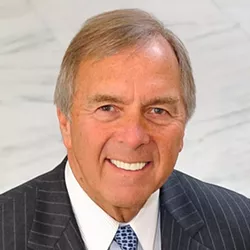Now that Donald Trump will likely become the Republican Party nominee this summer, his supporters should carefully consider what could happen to America if he loses the presidency or, if elected, does a lousy job as president.
Trump supporters have been hard-core. They haven't wavered in their support of him or his authoritarian ways, even when he showed ignorance about how government operates or made abusive comments about women, Muslims, current leaders or anybody else who came into his line of fire. Such loyalty is admirable — to a point. But what happens if he gets into office and can't fulfill the many promises he's made, or proves to be something he clearly isn't? Or loses badly to Hillary Clinton?
The political process that has served America for more than two centuries will suffer.
If Trump is the last, best hope of his supporters to change the political dynamic about which so many voters are angry, what happens to the American political system if they're let down by the one they consider to be their savior? If they become even more disgusted with our political process, America could fall apart as voters demonstrate their political dissatisfaction by dropping out, believing that no leaders are good enough to satisfy their desires.
Here's what we should expect of Mr. Trump: that he'll try to understand fundamental federal issues deeply and be less self-conscious; that he'll adopt reasonable policies to attempt to sway voters who will never vote for Hillary Clinton; that he'll adopt conservative values that turn away from big government, more federal debt and presidential power asserted through executive orders; and that he'll not ignore Congress as a co-equal branch of government. He should emerge as the anti-Obama/Hillary as far as public policies are concerned.
Ideally, Americans should opt for conservative leaders who understand how the American political system works and have concrete plans for how to make America better. Beyond sloganeering, which plays to our hopes and fears, leaders must reassure the public that they're in politics to do public good, not just benefit themselves. Hillary Clinton will lie about this. If Donald Trump is smart, he'll listen to the disaffected and be honest and transparent about his intentions. He's risen this far because many voters believe what he says. Now he has to follow through.
For Trump, being an effective president includes studying to understand how the American system works — historically, economically and in our relations with other nations. Even though many members of Congress are ignorant of it, Trump will have to know about America's past to counter Clinton's broad base of knowledge and her history of government service. If he does, he'll have an advantage in his legislative negotiations with Congress.
When the next president strides to the podium on January 20, 2017, to proudly take the oath of office, swearing to "preserve, protect and defend the Constitution," that person should have at least read it. The same goes for every other elected or appointed federal official. All American citizens should reread it and our other founding documents. Doing so will make us all better citizens, more able to understand our system of government and better able to participate in it. Politics is a participatory undertaking, intended to engage citizens. Any president had better understand the Constitution.
If Hillary Clinton wins the presidency, every word she utters will be suspect, and the America we've known will change dramatically. The Supreme Court will lean further left, Republican majorities in Congress will be at risk and Americans will be more dependent on government. Dependency discourages freedom and ingenuity.
If Donald Trump wins, but doesn't fulfill the dramatic promises he's made or otherwise proves to be far less than expected, his supporters will be dismayed with government even more. If they withdraw, government could become bigger with a more intrusive bureaucracy, further discouraging citizen participation.
The best result will be the creation of a new generation of principled leaders determined to reduce America's debt, restore American prestige abroad and support an opportunity society. The result will engender confidence in government, greater citizen participation in public affairs and encouragement for quality leaders to step up to public service.
Presumably, this year of bad candidate choices is a political aberration. But disappointing election results often spur quality individuals to step forward to serve others. When they do, voters will have their hope for the future restored, confident that the United States need not settle for crudeness or dishonesty in their elected officials.
Hopefully, better days lie ahead. ♦





















